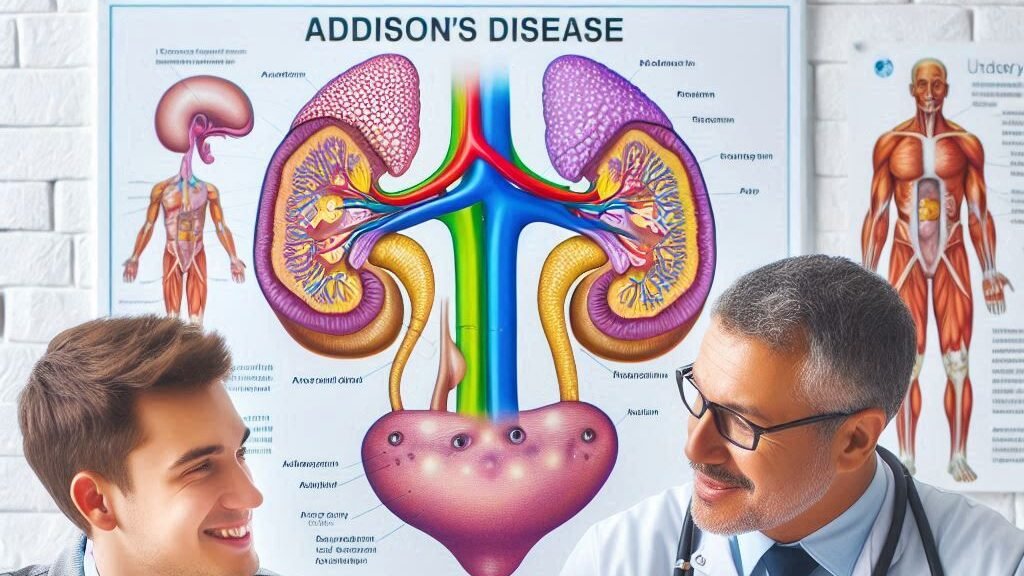Addison disease
Addison disease, more often referred to as primary adrenal insufficiency, is an interesting anyway severe endocrine disease that affects the adrenal glands.
These tiny structures located on the top of each and every kidney should play a very important role in synthesizing core components that regulate various physical processes.
When someone has Addison disease, their adrenal organs do not transmit adequate amounts of explicit synthetic substances, especially cortisol and aldosterone.

What is Addison disease?
Addison disease occurs when the adrenal organs are injured, resulting in the inability to produce normal levels of cortisol and aldosterone. It is continuously referred to as the ‘stress synthetic’ because it aids the body in noting pressure and also under processing and blood sugar regulation. Aldosterone, on the other hand, is always reminded of the real balance of salt and water concentration in the body.
Causes behind Addison disease
A suitable diagnosis and treatment of Addison disease requires comprehending the base motives of this phenomenon. The following are some of the essential factors that can incite this condition:
Immune system issues:
The most common cause for Addison disease is a reaction of the body’s immune system, which for unknown reasons attacks healthy tissues. Adrenal glands are attacked by your own immune system and system are mostly seen only when about 90% of the adrenal gland has been damaged.
Infections:
Some diseases, such as tuberculosis, HIV, and infections that cause septicemia, can affect the adrenal glands and result in Addison disease.
Drugs:
Continuous usage of such acute solutions, especially those used to cure all sorts of ailments, at some point might in some way affect adrenal function.
Other causes may be genetic.
Symptoms of Addison disease
The symptoms and signs of Addison’s disease develop very often develop in a slow pace since the damage to the adrenal glands happen slowly over time.
The most common signs and symptoms include:
- Fatigue that worsens over time and is one of the most common symptom.
- Reduced appetite and loss of weight.
- Melanosis, which is skin becoming darker than the usual complexion.
- Abnormally slow rate that might result in dizziness or fainting.
- Salt cravings
- Dehydration
- Abdominal Pains
- Nausea and vomiting
- Muscle spasm and joint pain
- Irritability and poor concentration
- Low glucose (hypoglycemia)
- In women, nonsynchronous or absent female monthly cycles
It is indeed a big thing to find out that not everyone who has the condition will have these symptoms, as the reality may vary from one person to the next.
Examination and Treatment
Diagnosis in this condition traditionally involves the following aspects: clinical history, genuine assessment, and tests. Other common tests include determination of synthetic hormones and pheochromoblasts as well as fervor tests to assess the capacity of adrenals as a way of positive assurance.
Following tests may be done to find out if you have the condition:
- Stimulation of ACTH (Adrenocorticotropic hormone) which tests how your adrenal gland respond to a shot of artificial ACTH.
- Blood tests to check the levels of sodium, potassium and cortisol in your blood.
- Insulin-induced hypoglycemia test to determine the main origin of your symptoms which can be in the pituitary gland (secondary adrenal insufficiency) rather than the the adrenal gland itself.
- Computed tomography or CT Scan that will evaluate your adrenal gland and pituitary gland.
When Addison disease is analyzed, treatment usually involves synthetic replacement therapy to supplement the synthetic hormones that the adrenal organs are not producing. This commonly integrates:

Oral corticosteroids:
I have found that these override the cortisol that the body isn’t making. Conventional medications depict hydrocortisone, prednisone, or cortisone acidic corrosive determination in extent.
Mineralocorticoids:
These override aldosterone. The most important remedy used is fludrocortisone.
Androgen replacement:
Occasionally, particularly with females, androgen replacement may be recommended for worn-out feelings and a lack of sparkle.
Those with Addison disease should accept these medications forever and undergo regular physical examination with a view to getting it ascertained that their artificial has been altered.

Conclusion
It is a complicated disorder that calls for well-settled organization, but with the right treatment and care, those affected by this could lead productive, active lives. Understanding all the causes of, secondary impacts of, and treatment choices for Addison disease is necessary for anyone with this illness, or their friend or relative.
FAQs
Will they make Addison disease feel better?
In the course of time, there is no solution for Addison disease. Anyhow, with hormone replacement treatment and traditional medical thinking, the individuals with Addison disease can truly put control on their disease and lead normal lives.
Is Addison disease natural?
Although Addison disease is not usually acquired, specific genes can increase the risk of developing the condition. Two interesting endomorphic concerns can distort adrenal organ volume and cause Addison disease. In addition, having a family foundation of safe framework issues could fabricate the bet of making invulnerable framework Addison’ disease.



